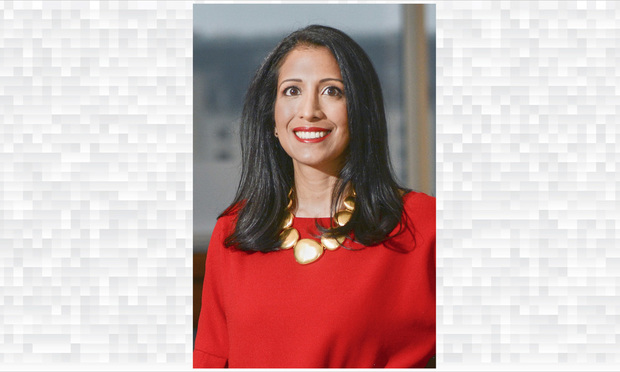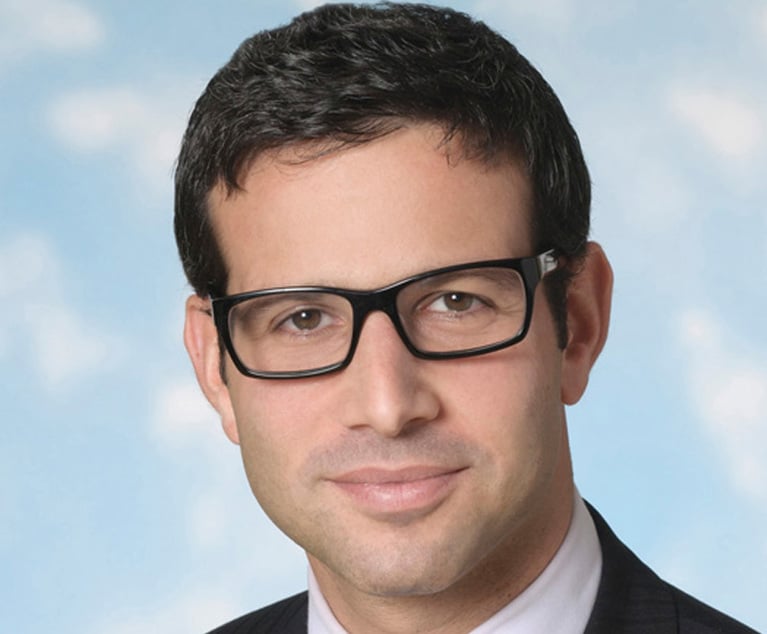On the Rise 2018: Sakina Rasheed Foster
Sakina Rasheed Foster, partner, Haynes and Boone
August 31, 2018 at 06:00 AM
6 minute read
 Sakina Rasheed Foster, partner with Haynes Boone.
Sakina Rasheed Foster, partner with Haynes Boone.
Sakina Rasheed Foster, partner, Haynes and Boone
Experience:
- Haynes and Boone, 2007-present
- Chamblee Ryan Kershaw & Anderson, 2004-2007
Education:
- University of Texas School of Law, 2003
- Southern Methodist University, 2000
What drew you to a career in law?
Growing up as the daughter of South Asian immigrant parents, it was always assumed that I would follow in my family's footsteps and pursue a career in the sciences. What drew me to the law was that I saw it as a career path that was novel and unchartered – and one that was a great fit for my oral and written advocacy skills.
Have you set a specific goal that you want to achieve in the next year?
My goal for the next year is to significantly increase the scope of work handled by the client teams I lead. The key to that will be the hard work of the teams I help lead and the excellent client service we must continue to provide. I am fortunate to be at a firm with a culture of teamwork – and to have clients that value our work – so that this type of growth can be achievable.
What has been your proudest career moment and your biggest hurdle?
Proudest Career Moment: My proudest career moment was becoming a partner at my firm. Like many associates, it was a goal I had been striving towards for years and it took the support and guidance of amazing mentors and sponsors along the way.
Biggest Hurdle: I was the first lawyer in my family and, when I entered the profession, there were not many attorneys in my North Texas Asian-American community. I distinctly remember my parents being worried when I announced that I wanted to go to law school. They were concerned about whether I would be treated fairly in a field that did not have many women or people of color in leadership positions. My father, an immigrant Indian physician in a small East Texas town, had faced his own professional obstacles as a minority, and he didn't want me to have the same uphill battle. Thankfully, I've been fortunate to find nothing but support and encouragement from my colleagues and mentors since I started practicing law.
Where do you fit on a 1-10 work-life balance scale with 10 being nirvana? Please explain.
This number varies on a daily basis – as I think it does for most lawyers. Some days, it has to be 100% about the work and my clients. Those are the days when I lean on my support network (my husband, immediate family and close friends) to make life work. Other days, work can be on the back burner and I need to be fully present with my loved ones or devote time to causes outside of work that feed my soul. If I average those days out, I would say that I'm at a seven. That is in large part because of my incredible support system and being at a firm that values our wellbeing and understands that to be excellent lawyers, we have to be happy and balanced human beings first.
What is the top quality that you've used to succeed in the profession?
It would be two qualities – diligence and resilience. I realized early on that I may not be the smartest lawyer in the room – but if I was the hardest working and most prepared, I would achieve the best results. Resilience for me has also been key. We will all get knocked down and fail from time to time. But, I've learned that the moment after a failure is critical. If I can pick myself up, stop beating myself up, reflect and learn from the experience, then that failure can actually be an opportunity to continue to grow.
Who is your favorite mentor and why?
I've had several important mentors during my career that have been critical – but the one who always stands out is my mentor and fellow law firm partner, Paul Amiel. Paul started out as my supervisor at the firm and by watching him firsthand I learned how an excellent lawyer serves clients and analytically and practically solves problems. But, Paul also invested time and energy to mentor me from the very beginning – and as a young associate who is trying to find their way in their career, that can be life-changing. Paul encouraged me early on to think about my career path and, once I figured out where I wanted it to go, helped me find the tools to get me there. Over the years, he's given me frank feedback when I needed to course-correct and has gone to bat for me when I needed an advocate. His mentorship has shown me how important mentors can be in an associate's career trajectory and, as a young partner at our firm, I try to emulate that with the associates I mentor.
What's the best advice anyone has ever given you?
One of my dear friends would always say “Don't compare your insides to other people's outsides”. Those words always stuck with me, because they remind me that everyone is dealing with their own battles and challenges and teaches me to have empathy for everyone I come across. It also reminds me of the negative impact it can have on us when we try to compare ourselves to how we perceive others are doing.
What trends are you observing in the profession that you're excited about?
I am very excited about the increasing emphasis on diversity and inclusion in our profession. I am proud to say that our firm and many of the clients I work with place a real importance on increasing the diversity of our legal teams and firm leadership. I know we have a long way to go as a profession, but it gives me hope that I work alongside people who believe in the importance of diversity.
What is the greatest challenge you see for the legal profession?
I believe that the biggest challenge for the legal profession is our well-being. Everyone knows the shocking statistics on the rate of lawyers with depression, anxiety, burnout and addictions – and how suicide affects our profession. Attorney well-being is so important and there are groups out there doing great work to try and help – such as the Texas Lawyers Assistance Program (https://www.tlaphelps.org/). If you know a lawyer who is struggling, please find your state's lawyers' assistance program or another resource and help them receive confidential assistance.
This content has been archived. It is available through our partners, LexisNexis® and Bloomberg Law.
To view this content, please continue to their sites.
Not a Lexis Subscriber?
Subscribe Now
Not a Bloomberg Law Subscriber?
Subscribe Now
NOT FOR REPRINT
© 2025 ALM Global, LLC, All Rights Reserved. Request academic re-use from www.copyright.com. All other uses, submit a request to [email protected]. For more information visit Asset & Logo Licensing.
You Might Like
View All
Kirkland's Daniel Lavon-Krein: Staying Ahead of Private Equity Consolidation

Vinson & Elkins: Traditional Energy Practice Meets Energy Transition
4 minute read
Advising 'Capital-Intensive Spaces' Fuels Corporate Practice Growth For Haynes and Boone
4 minute read
Get to Know Texas Lawyer's Attorney of the Year Finalists
Trending Stories
- 1Public Notices/Calendars
- 2Wednesday Newspaper
- 3Decision of the Day: Qui Tam Relators Do Not Plausibly Claim Firm Avoided Tax Obligations Through Visa Applications, Circuit Finds
- 4Judicial Ethics Opinion 24-116
- 5Big Law Firms Sheppard Mullin, Morgan Lewis and Baker Botts Add Partners in Houston
Who Got The Work
J. Brugh Lower of Gibbons has entered an appearance for industrial equipment supplier Devco Corporation in a pending trademark infringement lawsuit. The suit, accusing the defendant of selling knock-off Graco products, was filed Dec. 18 in New Jersey District Court by Rivkin Radler on behalf of Graco Inc. and Graco Minnesota. The case, assigned to U.S. District Judge Zahid N. Quraishi, is 3:24-cv-11294, Graco Inc. et al v. Devco Corporation.
Who Got The Work
Rebecca Maller-Stein and Kent A. Yalowitz of Arnold & Porter Kaye Scholer have entered their appearances for Hanaco Venture Capital and its executives, Lior Prosor and David Frankel, in a pending securities lawsuit. The action, filed on Dec. 24 in New York Southern District Court by Zell, Aron & Co. on behalf of Goldeneye Advisors, accuses the defendants of negligently and fraudulently managing the plaintiff's $1 million investment. The case, assigned to U.S. District Judge Vernon S. Broderick, is 1:24-cv-09918, Goldeneye Advisors, LLC v. Hanaco Venture Capital, Ltd. et al.
Who Got The Work
Attorneys from A&O Shearman has stepped in as defense counsel for Toronto-Dominion Bank and other defendants in a pending securities class action. The suit, filed Dec. 11 in New York Southern District Court by Bleichmar Fonti & Auld, accuses the defendants of concealing the bank's 'pervasive' deficiencies in regards to its compliance with the Bank Secrecy Act and the quality of its anti-money laundering controls. The case, assigned to U.S. District Judge Arun Subramanian, is 1:24-cv-09445, Gonzalez v. The Toronto-Dominion Bank et al.
Who Got The Work
Crown Castle International, a Pennsylvania company providing shared communications infrastructure, has turned to Luke D. Wolf of Gordon Rees Scully Mansukhani to fend off a pending breach-of-contract lawsuit. The court action, filed Nov. 25 in Michigan Eastern District Court by Hooper Hathaway PC on behalf of The Town Residences LLC, accuses Crown Castle of failing to transfer approximately $30,000 in utility payments from T-Mobile in breach of a roof-top lease and assignment agreement. The case, assigned to U.S. District Judge Susan K. Declercq, is 2:24-cv-13131, The Town Residences LLC v. T-Mobile US, Inc. et al.
Who Got The Work
Wilfred P. Coronato and Daniel M. Schwartz of McCarter & English have stepped in as defense counsel to Electrolux Home Products Inc. in a pending product liability lawsuit. The court action, filed Nov. 26 in New York Eastern District Court by Poulos Lopiccolo PC and Nagel Rice LLP on behalf of David Stern, alleges that the defendant's refrigerators’ drawers and shelving repeatedly break and fall apart within months after purchase. The case, assigned to U.S. District Judge Joan M. Azrack, is 2:24-cv-08204, Stern v. Electrolux Home Products, Inc.
Featured Firms
Law Offices of Gary Martin Hays & Associates, P.C.
(470) 294-1674
Law Offices of Mark E. Salomone
(857) 444-6468
Smith & Hassler
(713) 739-1250






